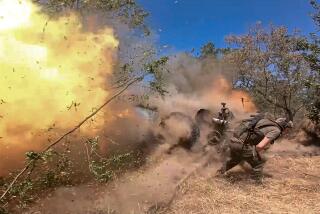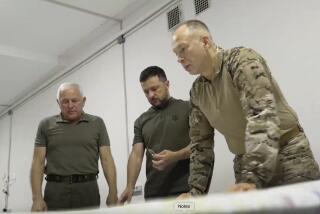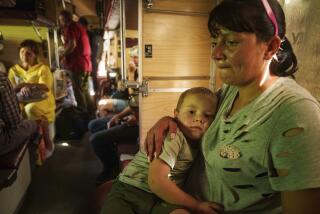U.S.-Backed Kurds Advance in the North
SHERAWA, Iraq â Kurdish fighters in northern Iraq continued to push toward the oil-rich city of Kirkuk on Saturday as Saddam Husseinâs troops abandoned their front lines to escape heavy airstrikes.
The U.S.-backed Kurds had advanced with little opposition on two fronts, from the north and east, and some were about two miles from Kirkuk.
Still, the lightly armed Kurds were far from seizing the city, and Husseinâs forces signaled that their pullback was a tactical retreat rather than a surrender. Iraqi soldiers fired artillery shells Saturday at a village recently taken by the Kurds east of Kirkuk.
The Kurdish forcesâ advance came as the U.S. military increased its strength in northern Iraq, bringing in reinforcements and heavy armor through the Harir airstrip in Kurdish-held territory north of Irbil, where paratroopers landed early Thursday.
The U.S. forces have been mounting joint patrols with Kurdish fighters, but it was unclear whether they were planning a joint offensive against the Iraqi army. Kurdish sources said fighters in the Patriotic Union of Kurdistan, which controls northeastern Iraq, moved into the town of Laylan, southeast of Kirkuk, on the heels of an Iraqi army retreat Saturday. The Kurds also were poised on high ground overlooking the city.
On Friday, Iraqi forces withdrew from their front-line bunkers on the main road leading north from Kirkuk, allowing fighters of the Kurdistan Democratic Party, which controls northwestern Iraq, to advance about six miles. They were about 15 miles from Kirkuk on Saturday.
Before pulling back, Iraqi forces laid hundreds of antitank and antipersonnel mines across the highway and in the surrounding fields.
Kurdish fighter Fazal Abbas Ahmed, 42, had no training, but he developed a knack for finding and disarming land mines during almost 13 years as a guerrilla. So he got the order to enter the minefield the Iraqis had left.
âI went there and started my job and had de-mined about 200 of them,â he said. âThe last one exploded in my hand.â The blast blew off Ahmedâs hand and wounded him in the thigh.
He was able to sit in a wheelchair Saturday at Irbilâs Emergency Hospital, which is run by an Italian charity. Ahmed is the sole provider for eight children, ages 9 to 18, with his wages of $125 a month. He doesnât know whether heâll get paid now that heâs wounded and worries that the children wonât have anyone to support them. But it couldnât be any other way, he said.
âWe are only thankful to God,â Ahmed said. âWhat has happened is his will.â
As noise from high-flying allied warplanes filled the sky, Ahmed strained against the sun to see them and said he wished they would move faster to get rid of Hussein. âThe sooner the better,â he said.
About 8,000 Iraqi soldiers withdrew from the front line at Sherawa, said Kurdish fighter Kurdawan Naqshabandu, 28. He was confident that they would simply dig in where they stopped and wait. âThey will not attack,â he said, and smiled. âThey are not allowed to by American planes.â
U.S. airstrikes were starting to grind down Iraqi soldiers on another front, at Kalak, on the highway to Mosul, Iraqâs third-largest city. Kurdish fighters said that each day brings more defections from the Iraqi lines, as soldiers defy their commandersâ threats of execution.
The Kurdsâ advance has been alarming Turkey, which is pressing Washington to rein them in.
Northern Iraqâs two main Kurdish forces want the U.S. to follow the strategy used in Afghanistan and let local fighters serve as the core of a ground force in a northern offensive, backed by U.S. air power. Turkey, however, fears that Kurdish control over Kirkukâs oil wealth will increase demands for Kurdish independence and feed separatist sentiment among its own Kurdish minority.
Although the U.S. and the Kurds are allied against Hussein, they donât always read from the same script. Zalmay Khalilzad, Washingtonâs special envoy to the Iraqi opposition, met in northern Iraq on Friday with Massoud Barzani, prime minister of the Kurdistan Democratic Party. Khalilzad told reporters that the U.S. had not urged Iraqis to rise up against Husseinâs regime and said the Kurdish forces should move into new territory only with the assent of U.S. Army Gen. Tommy Franks, who is leading the war.
But before the meeting, Barzaniâs faction issued a statement declaring that âthe Iraqi people in the north, center and south [should] prepare for an uprising and the liberation of the cities and villages from dictatorshipâ under the direction of the oppositionâs leaders.
In a further departure from U.S. plans, the statement added: âAt the moment of liberation,â opposition leaders will form âan independent coalition national government to run the affairs of the country.â That seemed a direct challenge to Washingtonâs stated intent to determine Iraqâs military and civilian administration until âa representative governmentâ can be chosen.
More to Read
Sign up for Essential California
The most important California stories and recommendations in your inbox every morning.
You may occasionally receive promotional content from the Los Angeles Times.










